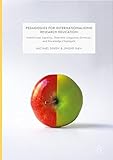Pedagogies for Internationalising Research Education [electronic resource] : Intellectual equality, theoretic-linguistic diversity and knowledge chuàngxīn / by Michael Singh, Jinghe Han.
Material type: TextSeries: Education Dialogues with/in the Global SouthPublisher: Singapore : Springer Singapore : Imprint: Palgrave Macmillan, 2017Description: XIX, 250 p. 1 illus. online resourceContent type: text Media type: computer Carrier type: online resourceISBN: 9789811020650Subject(s): Education | Languages | Language and languages | Comparative linguistics | Linguistics | International education | Comparative education | Education | International and Comparative Education | Comparative Linguistics | Asian Languages | Theoretical LinguisticsAdditional physical formats: Printed edition:: No titleDDC classification: 370.116 | 370.9 LOC classification: LB43Online resources: e-book Full-text access
TextSeries: Education Dialogues with/in the Global SouthPublisher: Singapore : Springer Singapore : Imprint: Palgrave Macmillan, 2017Description: XIX, 250 p. 1 illus. online resourceContent type: text Media type: computer Carrier type: online resourceISBN: 9789811020650Subject(s): Education | Languages | Language and languages | Comparative linguistics | Linguistics | International education | Comparative education | Education | International and Comparative Education | Comparative Linguistics | Asian Languages | Theoretical LinguisticsAdditional physical formats: Printed edition:: No titleDDC classification: 370.116 | 370.9 LOC classification: LB43Online resources: e-book Full-text access | Item type | Current library | Collection | Call number | Copy number | Status | Notes | Date due | Barcode |
|---|---|---|---|---|---|---|---|---|
| E-Books | MEF eKitap Kütüphanesi | Springer Nature | LB43 (Browse shelf (Opens below)) | Available | NATURE | 1419689-1001 |
Glossary of Anglo-Chinese concepts -- Chapter 1 Worldy orientations to internationalising research education -- Chapter 2 Pedagogies of intellectual equality -- Chapter 3 Socio-historial basis of Xingzhi research -- Chapter 4 Forming and informing Dintian Lidi researchers -- Chapter 5 Intellectual agents of trans-linguistic divergence -- Chapter 6 Post-monolingual education -- Chapter 7 Moving multilingual intellectual labour out of the shadows.
This book explores pedagogical concepts, metaphors and images of non-white, non-western researchers and research students on the inter/nationalization of education. Specifically, this book draws on the intellectual resources of China and India to explore the pedagogical dynamics and dimensions of the localization/globalization of education with non-Western characteristics. It introduces theoretic-linguistic non-Western concepts from the Tamil, Sanskrit and Chinese languages for use in Western, English-only education and redefines the intellectual basis for internationalising education. Debating whether 'international education' is Western-centric in terms of its privileging and promotion of Euro-American theoretical knowledge, this book contends that the internationalisation of Western-centric education can benefit from the intellectual power and powerfully relevant theorising performed by non-Western international students. It formulates a democratic vision for the internationalisation of education, with the potential to create transnational solidarity and constitute a forum for mobilising debates about global knowledge and power structures. It also provides key tools to use non-Western theoretic-linguistic tools and modes of critique in research undertaken in Anglophone Western universities.
5
